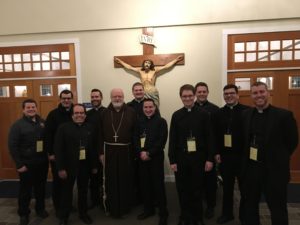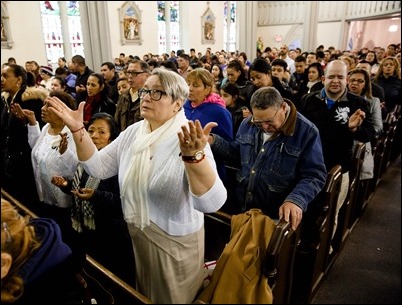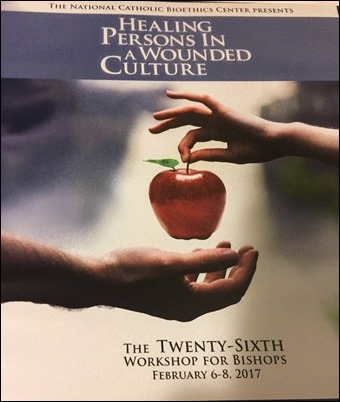Hello and welcome!
Last Sunday I met with Father Ray Dlugos, Sister Jeanne Gribaudo and Professor Joseph Kelly of Merrimack College, who came to speak about their faith formation program. 
We discussed some the plans they have to connect faith formation with community service, which is so popular among our young people today.
– – –
That evening, we held one of our periodic meetings with a class of seminarians. We always gather for a time of prayer followed by a meal and a chance to dialogue about their experiences and issues and events in the life of the Church. It’s a way for me to get to know the seminarians better and hear some of their aspirations and concerns. This time, I met with seminarians in second and third theology.

We spoke quite a bit about their experience at the March for Life last month in Washington D.C. We had almost 200 seminarians from Boston travel to Washington for the March, and it’s always a very important event in the seminary calendar.
– – –
Sunday, I went to Most Holy Redeemer Parish in East Boston to celebrate the noontime Spanish Mass. Holy Redeemer is one of our largest immigrant parishes and there were about a thousand people at the mass from all over Latin America.



Before the Mass, I read the letter that I had sent to over 100 immigrant communities in the Archdiocese of Boston speaking about the current immigration crisis. 


Also with us were Mayor Marty Walsh and Boston Police Commissioner William Evans and I asked them to address the people about immigration concerns.
Many immigrant families are very fearful because of recent developments in our country and things they are hearing in the press, and so I was anxious for people to hear from Commissioner Evans that the Boston police are here to serve the people in the community and that there is no need to be afraid of them. Commissioner Evans reminded the people that they are not agents of the immigration service, but are there to serve and protect the entire community. I think many people were greatly appreciative of his sentiments. 
Mayor Walsh spoke about his own immigrant roots and the efforts that the city is taking to make people feel welcome.
At the Mass I also took the opportunity to thank the pastor, Father Tom Domurat, and the parishioners for the extraordinary efforts that they are making take care of their church, which is a very historic Keeley church. The outside has been cleaned and repointed and now they are in the process of renovating the sanctuary. (This is why in the pictures you see a sort of tarp or screen blocking off the sanctuary from the rest of the church.)
In the past, too many beautiful churches have been lost because the ongoing maintenance is not attended to. But here we see how in this immigrant parish, which was built by very poor Irish immigrants, a new generation of Americans are stepping up to the responsibly to care for this building, so that people 100 years from now will be able to continue to use this wonderful sacred space.
– – –
Then, that afternoon back at the Cathedral, I was visited by Cardinal Baltazar Porras, the Archbishop of Merida, Venezuela; Bishop Raúl Biord Castillo, the Bishop of La Guaira, Venezuela, who is the nephew of the late Salesian Cardinal Castillo Lara; as well as number of theologians from Boston College who were participating in the Ibero-American Conference of Theology that took place this week at BC’s School of Theology and Ministry.
We had a very enjoyable conversation and it was very thoughtful of them to pay a visit and share with me some of their thoughts about the situation in Venezuela and the Church in the United States.
– – –
That evening, I departed for Dallas to attend the Workshop For Bishops hosted by the National Catholic Bioethics Center. For many years, they have been holding these workshops, which are seen as a program of ongoing formation for the bishops. The discussion and the lectures are centered around very important and practical issues. For example, one day, focus was on transgender issues, which was very helpful for all the bishops.
The NCBC, under the leadership of Dr. John Haas has provided invaluable service to dioceses, Catholic hospitals, and other Church agencies around the United States, helping to elucidate the Church’s teaching on bioethics issues, particularly in the application of the ethical norms for Catholic healthcare when applied to concrete situations that are sometimes very challenging. Here in the Archdiocese of Boston, we have ourselves often turned to the NCBC for their sage advice.
Joining us was the Apostolic Nuncio, Archbishop Christophe Pierre, who preached for us at the opening Mass. We were also greeted by the new Bishop of Dallas, Bishop Ed Burns, whose installation was this week. He had formerly been Bishop in Alaska, but he is a priest of Pittsburgh. We wish him well as he begins his new ministry in Dallas, where he is replacing Cardinal Kevin Farrell, who is now the new prefect of the Dicastery for the Laity, Family and Life.
The conference is always a wonderful opportunity for the bishops to be together. Because they also invite the bishops of Canada, Mexico, Central America and the Caribbean, the conference is also one of the few meetings where we have an opportunity to be together with bishops from neighboring countries, as well. I was so very pleased to be able to see so many bishops from the Caribbean who had been my colleagues when I was in the Virgin Islands, as well as one of my classmates, Bishop Paul Schmitz, who is the Bishop of the Diocese of Bluefields, Nicaragua.
I know the bishops are all so grateful to John Haas and the NCBC for hosting the conference and for the important service they have given to the Church, not only in our own country but around the world. We are also grateful to the Knights of Columbus who generously underwrite this gathering.
Until next week,
Cardinal Seán
